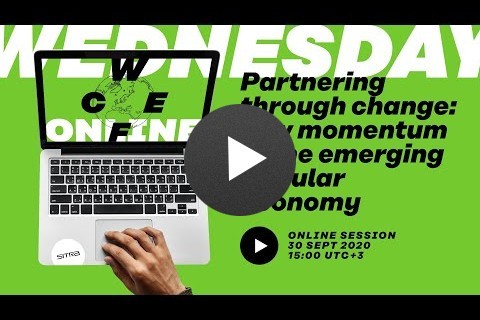Speeches Shim
Q1: What are examples of successful partnerships your organization participates in?
I’m so glad you asked, Steve. Partnerships are extremely important to the work we do at USAID.
USAID carries out nearly all of its work through partnerships. Whether through our relationships with private sector partners, host country governments or local NGOs—we couldn’t be successful without them.
Foreign assistance continues to go through a profound change in both the way it is financed and delivered. All funding across all donors combined is dwarfed by the resources coming from the private sector into emerging markets.
Given this increasing role of the private sector, partnerships for us are no longer an alternative way of supporting development, but a critical pathway to achieving results.
So I will share some of USAID’s many examples of partnerships, particularly those that are relevant to circular economy approaches.
Let me begin with a program committed to reducing poverty, improving food security, and empowering women. The program is called Aceli Africa, and I am so glad I get to sit alongside Per today, because the Ikea Foundation is a co-sponsor with USAID on this one.
Aceli Africa focuses on unlocking the growth of small and medium enterprises, or SMEs, in the agriculture sector. SMEs contribute more than 60 percent of agriculture production and trade in Africa, but face upwards of $65 billion in an annual investment gap. These challenges can not be addressed alone, so the Aceli approach has been designed by many partners to use evidence-based, innovative financial tools. Aceli investments are environmentally sustainable, emphasize local production and markets, and prioritize underserved populations.
Aceli just concluded its first transaction earlier this month—a loan to a 50 percent woman-owned rice processing company in Tanzania. Reaching farmer cooperatives and SMEs in East Africa is strongly aligned to the U.S. Government’s Feed the Future initiative to end hunger.
We are also doing a lot in the area of combating ocean plastic pollution, a global challenge that can’t be solved by any one entity working in isolation.
Our flagship program in this area is called Clean Cities, Blue Ocean, which is currently implemented in Asia and will soon expand to Latin America. This program partners with local governments, schools, community groups, companies, and the informal sector to form systems of waste management in the countries where we work.
Additionally, in June of this year, we signed an MOU with the Alliance to End Plastic Waste. Together, we plan to deploy innovative, local technologies, infrastructure, and business models to improve waste-management and recycling in cities and communities at the heart of the ocean pollution crisis.
As you can see, the partnerships we forge help communities in target countries solve their own development challenges as part of what we call the Journey to Self Reliance. USAID knows that the private sector is the engine in driving this self-reliance and economic growth, bringing us closer to the day when our assistance is no longer necessary.
Q2: Why are partnerships important?
I touched on this a bit in my last answer—but partnering with local organizations and private enterprises is really the most effective way to move the needle. USAID has an on-the-ground presence in most of the countries that are major contributors to the ocean plastic pollution problem, and our staff have long-standing and strong relationships with local organizations and governments. The innovative partnerships we forge with organizations that are large or small, local or multinational, are all catalytic, targeted, and strategic to make a sustainable impact.
In fact, at the end of 2018, USAID launched its first-ever Private Sector Engagement Policy. This is the foundation for responding to new market realities and building an equitable and resilient future across all countries where we work. Through partnerships, especially with the private sector, we can leverage each other’s unique skill sets and strengths, and tackle problems together that could not be addressed alone.
As I said, we are all looking for scale and sustainability to address effectively the most difficult development challenges the world faces. To get there, partnerships are not only important, they are necessary.
Q3: What makes a partnership a success?
This is a really important question to unpack, because thoughtful and strategic partnerships are integral to achieving results. Thankfully, USAID has a long history of working with all kinds of partners, and we’ve learned quite a bit from these experiences. Through more than 2,300 Global Development Alliances and other partnerships, we leveraged more than $43 billion in non-U.S. government funds to address development needs.
From our point of view, a successful partnership results when our private sector partners realize a clear commercial benefit from engagement with us, and that commercial benefit supports a clear development impact that we care about. The examples I referenced earlier demonstrate these types of successes. Through this shared value approach, we can achieve sustainability and scaled impact.
Most importantly, measuring impact, adapting, and learning from past partnerships is key to success. In a new study that USAID will soon release, we analyzed partnerships two or more years after USAID funding ended. We found out that partnerships that use market-oriented approaches are more impactful and sustainable than those that do not. Market-oriented partnerships have results that are more likely to be sustainable because they establish links to markets and new customer bases. The case is strong for USAID and other donors: partnership with the private sector brings about sustainable results and fosters self-reliance.
And, I would be remiss if I didn’t mention that all successful partnerships need to have shared ethics, which for us includes upholding responsible business practices, environmental protection, and respect for human rights.


Comment
Make a general inquiry or suggest an improvement.